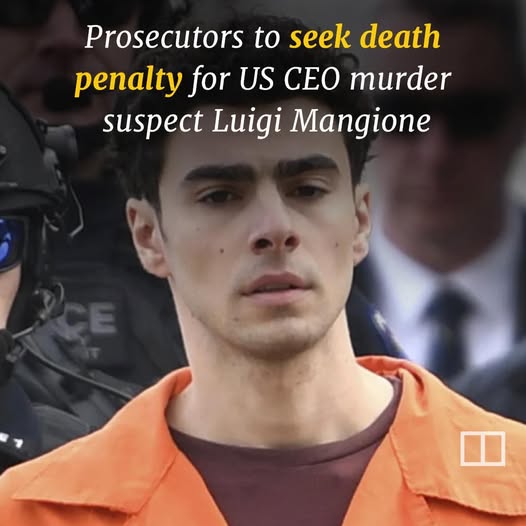Prosecutors Demand Death Penalty for Luigi Mangione After He Allegedly Killed Brian Thompson Health Insurance Executive in Cold-Blooded Murder
In a shocking and deeply unsettling turn of events, U.S. federal prosecutors have officially sought the death sentence for Luigi Mangione, the individual who stands accused of assassinating a high-ranking health insurance executive in a cold-blooded attack earlier this year. Mangione, who has gained notoriety in the media as the “CEO Killer,” allegedly carried out the heinous murder in broad daylight, sending shockwaves through both the business and healthcare industries.
The tragic incident unfolded on a crisp autumn morning in downtown Chicago when the victim, whose identity has not been publicly released pending further investigation, was found shot multiple times in their luxury office building. The CEO had been a prominent figure in the health insurance sector, known for both their influence in the corporate world and efforts to reform the American healthcare system. According to police reports, the murder appeared to be an execution-style assassination, with the victim shot at close range, leading to immediate questions surrounding the motive for such a brutal crime.
Authorities quickly turned their attention to Luigi Mangione, a 39-year-old man with a criminal history and alleged connections to organized crime syndicates, though no direct link to the victim had initially been established. Prosecutors, however, allege that Mangione’s actions were premeditated, claiming that the defendant had meticulously planned the murder of the health insurance executive due to a combination of personal grievances and alleged financial disputes. They also suggest that Mangione may have harbored significant resentment towards the victim, citing some form of professional rivalry and previous business dealings.
The Case Against Mangione:
The federal charges brought against Mangione include first-degree murder, conspiracy to commit murder, and several counts of illegal possession and use of firearms. Prosecutors are now seeking the ultimate penalty: the death sentence. They argue that the brutal and calculated nature of the crime, coupled with Mangione’s criminal background, justifies such a severe sentence.
In their bid for the death penalty, prosecutors have outlined the chilling details of the murder, claiming that Mangione stalked the victim for weeks prior to the incident. He allegedly researched the victim’s daily routine and meticulously planned the assassination in order to avoid detection. On the day of the murder, Mangione reportedly entered the building under the guise of a business meeting, before executing the victim in cold blood in the executive’s private office. According to surveillance footage and eyewitness accounts, Mangione left the scene without hesitation, moving swiftly to a getaway vehicle.
Federal investigators have worked tirelessly to piece together the circumstances leading to the assassination, but Mangione has remained tight-lipped about the motives behind the killing. His defense attorneys, however, have raised questions about the legality of some of the evidence presented against him and have indicated plans to challenge the death penalty recommendation in court.
The Impact on the Health Insurance Sector:
The murder of such a high-profile health insurance executive has raised concerns throughout the industry, which has already been grappling with numerous challenges related to healthcare reform and insurance accessibility in the U.S. Colleagues and professionals within the sector have spoken out about the tragic loss, with some pointing to the growing tension within the business world, particularly surrounding executives who navigate the complex and often volatile nature of the healthcare market.
“This is a chilling reminder of how far some individuals are willing to go to settle personal scores or business disputes,” said a spokesperson for a prominent healthcare organization, who wished to remain anonymous. “Executives in this industry are under constant pressure, but no one could have predicted that something like this would happen.”
Public and Legal Reactions:
Mangione’s arrest and the subsequent filing for the death penalty have ignited a national debate about the use of capital punishment in the United States. While some argue that the nature of the crime justifies the request for the death sentence, others have raised concerns about the fairness and ethics of such a penalty, particularly when the defendant has yet to be proven guilty in a court of law.
“I believe in justice, but we must also question whether the death penalty is the right approach in this case,” said one legal expert. “While Mangione’s actions were horrific, we need to remember that in the U.S., every individual deserves a fair trial and the opportunity for a defense. It is a delicate balance between justice and the protection of human rights.”
What Lies Ahead:
As the case moves forward, the legal battle is expected to become more complex. Prosecutors are committed to securing the death sentence for Mangione, citing the brutal nature of the crime and the suffering caused to the victim’s family and the broader community. However, Mangione’s defense team is already gearing up for an intense courtroom fight, which will undoubtedly be one of the most high-profile cases in recent years.
The eyes of the nation are on the outcome, with many questioning whether this case will further fuel the ongoing debates about crime, punishment, and the future of the death penalty in the U.S. With both the defense and the prosecution prepared for a prolonged battle, it is clear that this case will not only make headlines but could also set important precedents in the legal and criminal justice systems.
As of now, Luigi Mangione remains in federal custody, awaiting trial. The victim’s family and loved ones, meanwhile, continue to mourn the loss of their loved one, as they seek justice for a senseless act of violence that has left an indelible mark on the nation.

